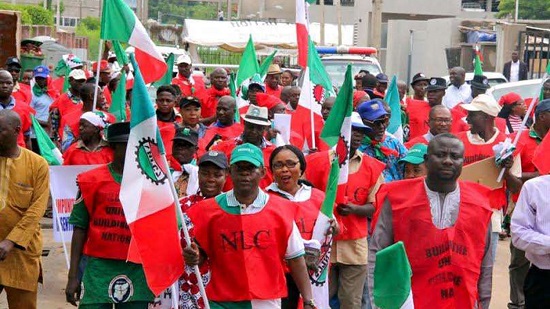This post has already been read 4612 times!
While a temporary ceasefire appears to have been reached in the fight for a new minimum wage, a battle for its seamless implementation could break out soon.
For workers in the private sector, there might be no fresh minefields between them and the new wage. This is however not the case with public sector workers whose fate currently hangs in the balance.
Following the signing of the new wage by President Muhammadu Buhari, which provided the legal framework for a new wage floor, further negotiation on the punch it packs for other salary levels, especially GL 07 to GL 17, has proved difficult.
Yesterday, the Nigeria Labour Congress (NLC) and Trade Union Congress (TUC) wrote a letter to Secretary to the Government of the Federation Boss Mustapha warning that the non-implementation of the minimum wage could snowball into a major industrial crisis.
Also, Anchaver Simon, who is the acting chairman of the Joint National Public Service Negotiation Council (NPSNC) Trade Union Side, said industrial peace would be jeopardised if the technical committee on consequential adjustment is not re-opened immediately.
According to him, mobilisation and sensitisation of public service employees in the 36 states of the federation including the Federal Capital Territory have commenced “to prepare them for total trade union action in the event that negotiation on the consequential adjustment arising from the N30,000 monthly new national minimum wage completely breaks down.”
He disclosed further that consultations are ongoing with both the Nigeria Labour Congress (NLC) and Trade Union Congress (TUC) on the proposed action.
“The effects of poor salaries would worsen the deteriorating condition of the nation’s security. Poor pay will also heighten corruption among government employees. How can we secure our country and conquer corruption when the operators of the system are poorly remunerated?
On his part, TUC president, Quadri Olaleye, said: “We wonder why anything that has labour undertone becomes the issue of rejection by government. The government is testing the patience of the workers. We assure them that they either go to the negotiating table to complete the assignment or risk the wrath of the workers.”
Workers in Enugu State are also mobilising for an industrial strike following the deadlock in talks between their leaders and state government officials on the new wage.
A joint negotiation council composed of 10 members drawn from government and labour representatives had been constituted by the state government to dialogue on the wage. The Guardian, however, gathered that negotiations stalled as both parties failed to agree on a workable formula.
The six states in the south-south meanwhile have expressed willingness to pay the new wage once the national wages commission works out the modalities.
In Rivers State, Governor Nyesom Wike has repeatedly declared that the state is in a position to pay the wage, though he argued that the single national minimum wage system is an aberration in a federation.
In Akwa Ibom State, workers said they didn’t have issues with Governor Udom Emmanuel, as he has already expressed readiness to pay.
But the Oyo State government said it is waiting for the Federal Government to start the implementation of the new wage first.
The chief press secretary to Governor Seyi Makinde, Taiwo Adisa, said: “I don’t know when they will start. Let them start with Abuja first. Let your people report first. We don’t have any problem.”
Some economic experts meanwhile have advised the Federal Government on how to resolve problems regarding the minimum wage.
In an interview with The Guardian, Andrew Nevin, Chief Economist, Advisory and Partner, PwC, said: “Rather than dissipate energy on this type of legislation that is not possible to implement, the Federal Government should
focus on pro-growth policies that mean we are not debating whether we can pay civil servants this small amount.
“In addition, the government should rethink whether the minimum wage policy should be a national policy. Every state has its own economic conditions and perhaps the minimum wage should be decided at the state level.”
He said the problems with implementing the new wage exist fundamentally because the economy is not growing. “Expressed in USD terms, the new minimum wage is less than USD85 per month, which is not adequate for a family to live on anywhere in the country.”
Another expert on economic matters, Henry Boyo, argued that the 2019 budget is heavily skewed in deficit, saying the new wage might not really meet the expectation of workers. He noted that if the government implements the wage across the board, the country will have more people struggling.
“We will have disposable income within the economy struggling. And when that doubles and the doubling is not created by any productive enterprise, you will find out that the outcome of that would be rising inflation.
“There is inevitability that if the states and other government agencies decide to pay the new minimum wage, and work it out on a pro-rata basis across the spectrum of job class, it will be difficult for Nigerians to enjoy any infrastructural development because we are already spending 70 per cent of total income on recurrent expenditure from the 2019 budget. So, by the time they increase the minimum wage by the margin that they have decided, you find out that capital expenditure might not be more than ten per cent of the total budget.”
He said: “It is not the quantum nominal value of income that is important but what it can purchase. The way forward is to remove excess liquidity in the system and ensure the Central Bank of Nigeria does not continue deliberately to convert dollar earnings to naira and create the potential for excess liquidity and inflation to the people.”
[The Guardian]



